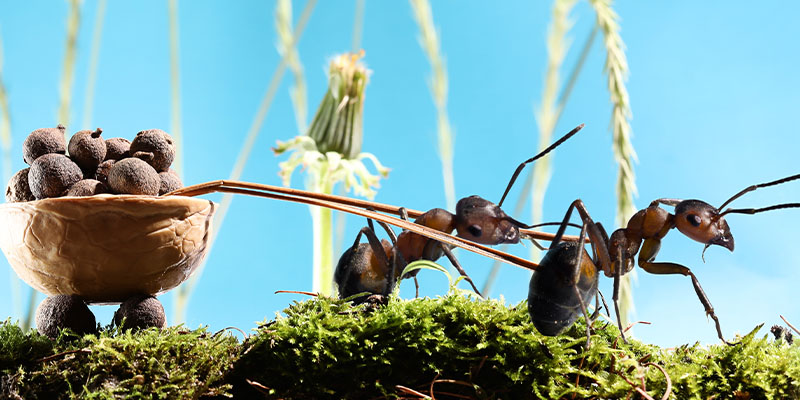How Jacksonville Homeowners Can Prevent – and Get Rid of – Super Colony Ants. Ants are fascinating insects known for their complex social structures and colony behavior. Among the various ant species, some form super colonies, which can be massive and challenging to control. This is why it’s quite important to understand what super colony ants are, how they come together, what attracts them, and the potential dangers they pose, preventive measures and effective eradication strategies are crucial for homeowners to protect their properties from these persistent pests.
What are Super Colony Ants?
Super colony ants are large groups of interconnected colonies of the same ant species that exhibit extraordinary cooperation and coordination. Unlike typical ant colonies, which are territorial and compete with each other, super colonies consist of multiple nests spread across extensive spatial areas. These ants share resources and exhibit a lack of aggression towards each other, effectively forming a “mega-colony” that can cover vast territories.
Super colony ants come together when the queens of two or more colonies meet and mate. The queens then lay eggs that hatch into workers that are loyal to both colonies. From this union comes a remarkably complex structure that can spread the extended family much further across a given area.
The workers of a super colony can come from different species of ants, but they will all work together as if they were from the same colony. This makes them very difficult to control, as they are not susceptible to the same pesticides that would normally kill a single colony.
How Super Colonies Form
Super colonies often arise from introductions of genetically related ants, either through natural expansion or accidental human transport. The lack of territorial aggression allows these introduced ants to join forces and establish an interconnected network of nests, creating a super colony. This unique behavior has been observed in various ant species, such as Argentine ants (Linepithema humile) and red imported fire ants (Solenopsis invicta).
Main Attraction Factors for Super Colonies
Several factors can attract super colony ants to residential areas. Generally speaking, super colony ants come together when the queens of two or more colonies meet and mate. The queens then lay eggs that hatch into workers that are loyal to both colonies.
The workers of a super colony can come from different species of ants, but they will all work together as if they were from the same colony. Again, this makes them very difficult to control, as they are not nearly susceptible to the same pesticides that would normally kill a single colony under normal circumstances. As for attractors, those are none other than food, shelter, and water:
- Food sources. Super colony ants are attracted to readily available food sources, such as spilled sugar, crumbs, and pet food left outdoors.
- Shelter. Residential properties often provide ideal shelter opportunities, such as cracks in pavement, building foundations, and tree trunks.
- Water. Super colony ants, like all ants, require water to survive, and they may be drawn to areas with accessible water sources.
As you can plainly see, ants (just like almost every other pest) are attracted to the same things because these items are necessary for survival. Without food, water, and shelter, any ant colony would die off.
Dangers of Super Colony Ants
Just a single ant colony can do some damage and pose a relatively small danger. But, super colony ants can pose various dangers to homeowners that include the following:
- Property damage. Super colonies can rapidly infest homes, damaging structures, and electrical wiring by excavating nesting sites.
- Agricultural impact. Some super colony ant species, like the Argentine ant, can damage crops and disrupt the local ecosystem.
- Displacement of native species. Super colonies can outcompete and displace native ant species, leading to imbalances in the local ecosystem.
And, perhaps the most disconcerting danger is sting and bite hazards. Super colony ants, particularly fire ants, can sting or bite humans and pets, causing painful reactions and potential allergic responses.
Preventive Measures Homeowners Can Take
Pretty much any household is attractive to super colonies. So, in order to ward off super colony ants from forming colonies on your property, consider the following preventive measures:
- Sanitation. Keep your property clean, removing food scraps, crumbs, and any potential food sources that may attract ants.
- Seal entry points. Seal cracks and crevices in foundations, walls, and windows to prevent ant access into your home.
- Landscaping. Trim vegetation away from your home to minimize opportunities for nesting sites.
Also, be sure to address water sources. Fix any leaks and ensure proper drainage to reduce standing water that may attract ants.
How to Eradicate Super Ant Colonies
If you find an infestation of super colony ants on your property, it’s essential to take appropriate action and do so right away or it will only grow larger and become more problematic. You can use the following to get rid of a super colony:
- Insecticides. Use insecticides specifically formulated for ant control to treat nests and trails. Follow the product instructions and safety guidelines.
- Baits. Ant baits can be effective in controlling super colonies, as foraging ants will carry the bait back to their nests, affecting the entire colony.
- Professional pest control. For severe infestations or if your eradication efforts are not successful, consider consulting a professional pest control service with experience in dealing with super colonies.
If you choose to start out with insecticides and baits, be sure to follow the manufacturers’ instructions carefully for the most effectiveness and to avoid inadvertent accidents.
What We’ve Learned about Super Colony Ants
Super colony ants can present a significant challenge for homeowners due to their extensive networks and cooperative behavior. Understanding how super colonies are formed, what attracts them, and the potential dangers they pose is crucial for implementing preventive measures.
If you encounter a super colony infestation, swift action using appropriate insecticides or ant baits can help control and eradicate these resilient pests. By adopting preventive strategies and acting promptly in case of an infestation, homeowners can safeguard their properties from the dangers posed by super colony ants.

